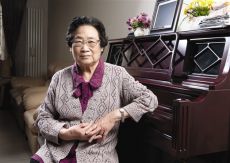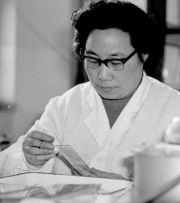Tu Youyou
Tu Youyou (屠呦呦) is the first Chinese national to win a Nobel prize in science. Tu discovered Artemisinin, a drug that has significantly reduced mortality rates for malaria patients.
Born in 1930, Tu won the 2015 Nobel Prize for Physiology or Medicine for her work on treating malaria. She shares the prize with Irish-born William Campbell and Japan's Satoshi Omura.
Juleen R. Zierath, chairman of the Nobel Committee, said that Tu's "inspiration from traditional Chinese medicine" was important. "But what was really critical was that Tu identified the active agent in that plant extract," said Zierath, adding that "there was a lot of modern chemistry and bio-chemistry attached to this to bring forward this new drug."
In a congratulatory letter, Chinese Premier Li Keqiang said that "Tu's prize symbolizes China's prosperity and progress in scientific and technological fields, is a great contribution by traditional Chinese medicine to health, and displays China's growing strengths and rising international standing."
Since it was anounced the 84-year-old won the Nobel Prize, Tu's former residence in Ningbo, Zhejiang Province, where she lived until she went to university in Beijing, has become an instant atrraction for parents and their children due to China's admiration of outstanding scholars-even though it is not open to the public.
The house, which is for sale, covers an area of 2,200 square meters and is part of a complex of 37 traditional buildings, including several city-and district-level cultural relic preservation sites, that have been transformed into a high-end art and commercial zone. It was built by her maternal grandfather, Yao Yongbai, who was once a member of the Ningbo General Chamber of Commerce and a professor at Shanghai's Fudan University. It is owned by her uncle Yao Qingsan, an economist and former president of the Ningbo-Hong Kong Fellowship Association, and is priced at 150 million yuan ($23.6 million).
Another site that has become a bigger tourist draw these days thanks to Tu's success is the Luofu Mountain scenic area in Huizhou, Guangdong province, where Ge Hong, a TCM master of the Eastern Jin Dynasty (AD 317-340) picked herbs, developed herbal medicines and wrote the classic Manual of Clinical Practice and Emergency Remedies.
After winning the Lasker Award in the United States in 2011, Tu said she and her team were inspired by Ge's theory to solve the puzzle in extracting artemisinin from the herb Artemisia annual, also known as sweet wormwood.
Tu married Li Tingzhao in 1963. The couple have two daughters.

